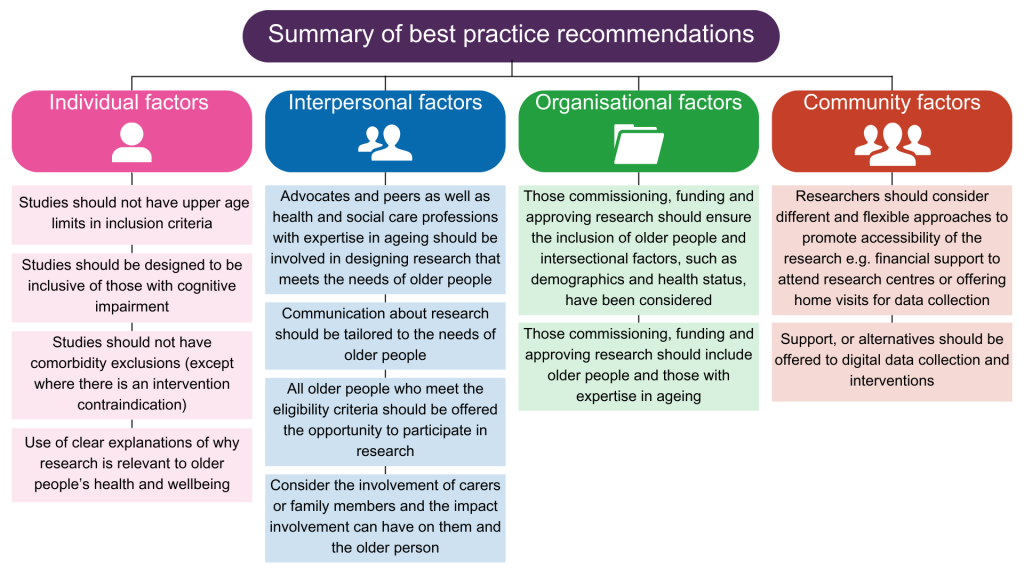How to include older people in health and social care research
SCOPE
These recommendations have been designed to aid researchers designing clinical trials to consider barriers to including older patients in their trial. The recommendations can also help researchers to develop strategies to attempt to address such barriers in order to improve the design and conduct of health and social care research. Although the recommendations were developed with UK-based clinical trials in mind, aspects may also be relevant to different types of research and research conducted in populations outside of the UK. Whilst the recommendations focus on the inclusion of older patients, the list of underserved groups in clinical research is extensive and researchers need to be aware of this when identifying barriers to research and developing to strategies to address barriers.
OLDER PEOPLE IN HEALTH AND SOCIAL CARE RESEARCH
Older people constitute a broad heterogenous group, ranging from healthy individuals to those with severe health issues and dependency. Along with people who have multiple long-term conditions, older people are the highest users of health and care resources but are often excluded in some areas of health and social care research through restrictions in upper age limits, the presence of comorbidities, and cognitive impairment.
The recommendations for including older people in health and social care research and based on the NIHR INCLUDE framework and aim to provide researchers with practical advice to improve the inclusion of older people in research.
 The following four questions may guide those developing, reviewing and funding research relevant to older people:
The following four questions may guide those developing, reviewing and funding research relevant to older people:
- Engagement: Are representative older people, their family members, advocates, and those with experience of working with older people involved in designing the research?
- Inclusive study design: Has consideration been given to where the research takes place, how researchers interact with older people and family members and what happens during interactions to maximise the accessibility of research to older people and family members? This may involve piloting study procedures to ensure they are feasible and acceptable.
- Resources: Have adequate infrastructure and financial resources been costed into funding applications to maximise participation, minimise withdrawals and ensure recruitment targets are met? There is a need to recognise that studies involving older people and family members may require additional resources, such as staff time and travel to conduct face-to-face recruitment and data collection at the person’s home.
- Communication: Have a range of approaches to communicating with older people and family members about research been considered in terms of promoting the study, recruitment, data collection and dissemination.
The full paper describing the development of the recommendations can be found here.
The work was led by Professor Vicki Goodwin at Exeter University.
EXAMPLES
Example 1 (coming in the future)
Example 2 (coming in the future)
coming in the future…
Insights
Coming in the future
FUNDERS AND OTHERS SIGNPOSTING RESEARCHERS TO INCLUDE
The National Institute for Health and Care Research (UK)

The Belgian Health Care Knowledge Centre, KCE (Belgium)

The Chief Scientist Office (UK)

The Wellcome Trust (UK)

The NHS Research and Development Forum (UK)

ADDITIONAL RESOURCES
Download general INCLUDE guidance
Download COVID-19 specific INCLUDE guidance
Development of this guidance involved Patient and Public Involvement Groups based at the University of Manchester and the University of Leicester.
It was supported by the National Institute for Health and Care Research (NIHR) Applied Research Collaborations (ARCs) for Greater Manchester, and East Midlands. Groups were primarily coordinated and facilitated by Lydia Morris (University of Manchester, NIHR ARC Greater Manchester) and Nasima Miah (The Centre for Ethnic Health Research, NIHR ARC East Midlands).

